“Thus shall you think of all this fleeting world
A star at dawn, a bubble in a stream..”
Diamond Sutra
We imagine our destinations before arriving, but that’s just maya, a star at dawn which vanishes with the full light of day. Imagining “how it will be” shadows the events that actually do unfold – even those real experiences are coloured by our mind-set. Now I look back at Landour as if at a dream. Among the shifting mists and mountains, the ferns and forests, and among new friends, our days there evolved like a script written for protagonists somewhat bemused by their roles. After all, travellers, although perhaps the producers of the journey, have not yet met the other cast members, nor more importantly, that ultimate stranger, the director. In plainer words, things do not always turn out as expected.
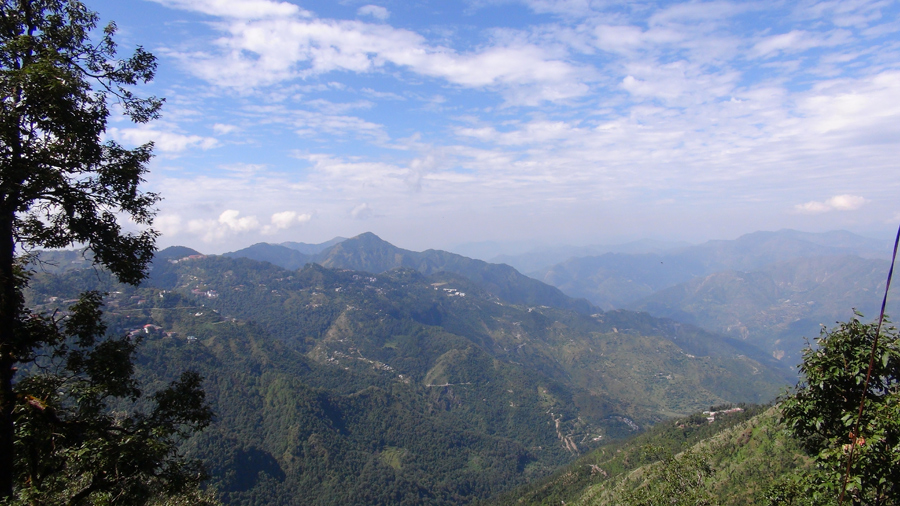 I’ll always remember the moment we arrived at Wolf’s Burn. The road winds up from Dehra Dun, past the Tibetan colony on its outskirts, narrowing as the heights of Mussoorie are reached an hour or so later. The ascent continues to Landour Bazaar. Here, cars must reverse and shuffle, changing positions gradually to round the bends if other vehicles are met. Pedestrians squeeze against little crooked shopfronts displaying cloth, shoes, or groceries. At the top, past the bazaar, the town dwindles away and the world becomes forest.
I’ll always remember the moment we arrived at Wolf’s Burn. The road winds up from Dehra Dun, past the Tibetan colony on its outskirts, narrowing as the heights of Mussoorie are reached an hour or so later. The ascent continues to Landour Bazaar. Here, cars must reverse and shuffle, changing positions gradually to round the bends if other vehicles are met. Pedestrians squeeze against little crooked shopfronts displaying cloth, shoes, or groceries. At the top, past the bazaar, the town dwindles away and the world becomes forest.
The car stopped and we stepped out at Wolf’s Burn, into silence. There was a constant, mesmeric humming of cicadas. Somewhere nearby was the gentle clanging of a cow bell. The deodars stood tall and calm all around in the cool air, and through the gateway was a garden of blue salvia, russet chrysanthemums, the late summer glow of dahlias. It felt like paradise, after the heat and noise of the plains below. The silence!
Landour is like no other hill station we have seen, in India, because although its charming (and well engineered, well maintained) roads, cottages, churches and community centres were built in the British colonial era, originally as a convalescent retreat, much of that development is little changed. Unlike most hill stations, Landour has not been swamped by new construction, or increased population, because it is a cantonment area, and the administrative military, encamped on the hill summits, does not allow building in its near vicinity. At least, that is what we gathered in the two weeks we spent in this peaceful enclave, which still retains a marked ‘expat’ presence – a really delightful mix of local people and indigenised foreigners. Landour was a missionary town, and that history lingers.
Many denominations of Christian missionaries from Europe and America set up schools here in the cool air; amongst these was Woodstock, still considered one of the finest schools in India. Many people we met in Landour were connected in some way with Woodstock school – either by having children there, by teaching, by having been students when young. My familiarity with its name, and even with Landour and Mussoorie, and tales of the mountains around, began several years ago. I had read then the wonderful All The Way to Heaven, an autobiographical account of a childhood in the Himalayas, written by Stephen Alter, himself an American “mish kid”, who still resides in Landour. He is not Mussoorie’s only well known author. There’s the much loved Ruskin Bond, whose folksy and historical tales are sold in bookshops India wide, and Bill Aitken, a Scottish born religious studies scholar and rambler, who chronicles his experiences of India’s mountain regions and sacred rivers. Their writings had opened doorways to this lovely and powerful landscape, for me, telling of times gone by, both in living memory and in the more ancient Garhwali cultural myths and beliefs.
One such anecdote is Bill Aitken’s description of the creation of a new Ganesha shrine on Gun Hill, a popular climb in central Mussoorie. A natural rock formation by the path looks a little like an elephant: someone painted an eye on it and, soon after, a collection bowl for offerings to the god was placed nearby. Then a fence was built around the “shrine” so that the offerings could not be pilfered. It had become a fully fledged little temple! Aitken remarked that this suited everyone – the local people who love to revere such natural features, the ‘temple’ priest who made money and had additional occupation, and the offerings helped pay for the building of the fence and hence the temple creation. Neat!
We would not be hiking steep forest tracks to mountain passes or far flung villages, living with distant gurus or speaking the language of local people, as these writers had done since their youth. Each day we walked the 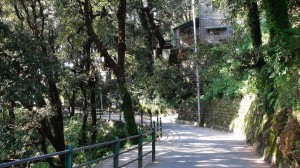 roads that wound around the hilltop; like other visitors, and local people tired of the lingering monsoon dampness, we hoped to see the snowy peaks of Bander Poonch and Swargarohini. But hazy cloud always obscured those ultimate views, despite it being well into October, when days are normally clear. We weren’t too disappointed; we’d be in the mountains for a month, here and in Almora. Other visions of our time in Landour had not eventuated, either.
roads that wound around the hilltop; like other visitors, and local people tired of the lingering monsoon dampness, we hoped to see the snowy peaks of Bander Poonch and Swargarohini. But hazy cloud always obscured those ultimate views, despite it being well into October, when days are normally clear. We weren’t too disappointed; we’d be in the mountains for a month, here and in Almora. Other visions of our time in Landour had not eventuated, either.
In Australia, my lame attempts to learn Hindi had faltered almost to nothing. I was inspired with the vision of great leaps forward – of watching films without subtitles, of conversing with strangers on trains – if I attended the Landour Languages School. Why, I would finally learn the four different versions of the letter ‘d’ in devanagari alphabet; I’d be able to pronounce ‘ghats’ with an aspirated ‘h’. Meanwhile, Michael would focus on his database work, we’d walk the hills, and in my ‘spare time’ I’d write my blog! It would be a quiet and stabilising spell, in a peaceful environment, readying ourselves for the next demanding five months of this journey.
But between my faltering resolve, and a change of story script (or the lack of a ‘headmaster’ understudy) this plan fell apart. The head of the school was not there for our appointment time; the second-in-charge was vague about his arrival on future days, and vaguer still about my request for their prescribed text book to begin my study. It was a very ‘Indian’ outcome. Tired from the whole journey so far, I relievedly succumbed to the convalescent aspect of Landour, resting my Hardwar-virus-weary body, or, it could be said, retiring from the Protestant work ethic to a more Sufi-like abandon to the ‘now’.
Other members of the Landour cast conspired with this change of plans. Apart from the doctor acquaintance I have mentioned in an earlier post, who gaily advised being ‘open to the moment’, our new friends at Wolf’s Burn were so welcoming, made us so much a part of their family, that the solitude of work began to feel mean spirited. Each morning we took our computers to a table in the sunshine outside our little kitchen door, to find best internet connection and to warm ourselves while we worked at our projects. The little girls next door, Pargati and Shoba, thought it was fun to have new people to smile at, to shyly watch the computer screens; besides, we were in their play area. Beautiful Immu passed by on her way to work at the school, and stopped for a chat, as did Bramesh, as he set out to walk his dogs. Jani came out, hopped on the stone fence, to peg the washing on the line between the trees. “Namaste”! Her husband, Jokha, goes by with some timber to repair Peter and Jagu’s window. We see them later in the day, when they too emerge to sit in 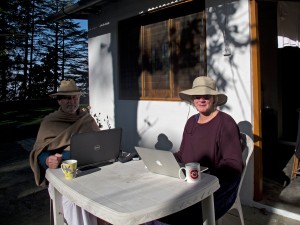 the sun, and their many friends, or those of their son Zach, come to visit. We are invited to dinner, or to join the friends, and they are all so delightful and interesting that we find ourselves laughing as we would with our friends at home, and drawn into serious discussion about their lives. By the time we leave, I feel genuinely sad to say goodbye, and drawn to return to live here (for a time) in the welcoming warmth and intelligence of this small community.
the sun, and their many friends, or those of their son Zach, come to visit. We are invited to dinner, or to join the friends, and they are all so delightful and interesting that we find ourselves laughing as we would with our friends at home, and drawn into serious discussion about their lives. By the time we leave, I feel genuinely sad to say goodbye, and drawn to return to live here (for a time) in the welcoming warmth and intelligence of this small community.
Even on our daily walks around the quiet hilltop road we make new friends and are drawn into local rivalries and alliances. I learn where to shop for lentils, eggs and vegetables, and we find the delights of the Prakash store at Sister’s Bazaar, which has real cheese, English teas and biscuits, tins of salmon, and good brown bread. We walk past houses named Rose Cottage, Ivy Bank, Oaklands and other evocative English names, an other-worldliness emphasised by the ferns sprouting from roadside banks, wild dahlias and michaelmas daisies, zinnias and marigolds in garden beds. But leopards still roam the forest, langurs swing in the roadside 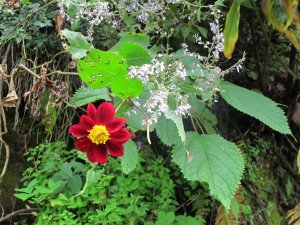 trees, pack donkeys are tied to hitching posts, and birdlife is uniquely Indian. In the utter silence of nights we hear a ‘bip, bip’ of an owl call, exactly every six seconds, sounding astonishingly like an electronic alarm. On clear nights, Dehra Dun twinkles far below like a floor of stars. The mists come and go. We watch the language school students frown over their studies in the cafes of Char Dukan; we watch the holiday makers from the plains flood in at weekends. We are told of the Englishman in his eighties, resident here most of his days, who resists the government order to repatriate by having himself charged with minor criminal offences; while his case is pending, he cannot leave the country. The legal system being so slow, he will no doubt see out his days on his little hilltop, in “Oaks End”.
trees, pack donkeys are tied to hitching posts, and birdlife is uniquely Indian. In the utter silence of nights we hear a ‘bip, bip’ of an owl call, exactly every six seconds, sounding astonishingly like an electronic alarm. On clear nights, Dehra Dun twinkles far below like a floor of stars. The mists come and go. We watch the language school students frown over their studies in the cafes of Char Dukan; we watch the holiday makers from the plains flood in at weekends. We are told of the Englishman in his eighties, resident here most of his days, who resists the government order to repatriate by having himself charged with minor criminal offences; while his case is pending, he cannot leave the country. The legal system being so slow, he will no doubt see out his days on his little hilltop, in “Oaks End”.

Tom Alter
Most entertaining of all our walking acquaintances are those who come up with a beaming smile, and say to Michael “I know you! You are…?” They are excited to think they are meeting the Bollywood film star Tom Alter, cousin of Stephen (the writer) who also resides here on occasion. They admire his similarity to Michael, and wave to us from cars, so that we become accustomed to dealing with Tom Alter fans on most of our walks. We do meet with Stephen Alter, who is gracious but busy, preparing for a writers festival to be held in several weeks time. I wish I could be here then, but only too soon we leave the misty damp of Landour for the other side of Uttarakand, the drier mountain vistas of the Kumaon Hills.
I am glad our script was rewritten, as my memories of Landour are ones to treasure. I could return one day, to our friends, perhaps finally to attend the Language School, even to teach at Woodstock. Perhaps then we could step into the wider play of Garhwal, the older sense of this place of sacred mountains, the wilder, deeper world more intrinsic to its spirit. Who knows? I am reading Haruki Murakami. He writes, ‘I was nothing but a pathway for the person known as me”. I like that. It allows so many possibilities, and the mystery too.
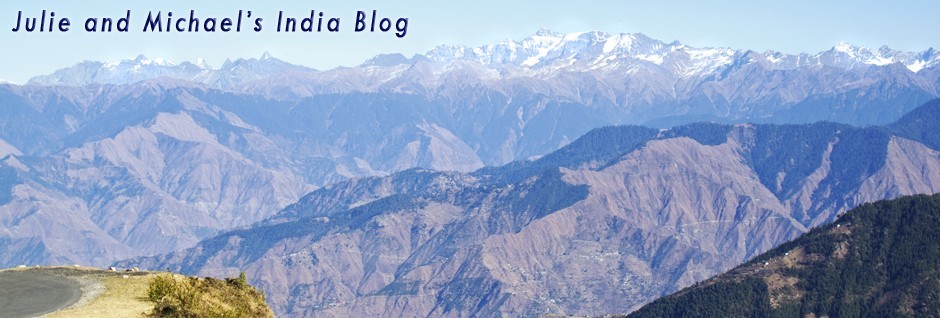
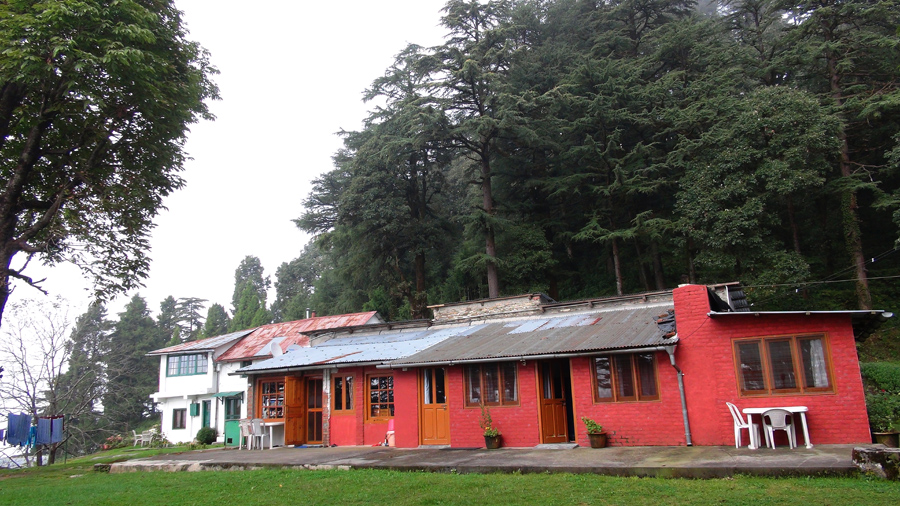
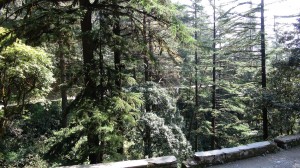
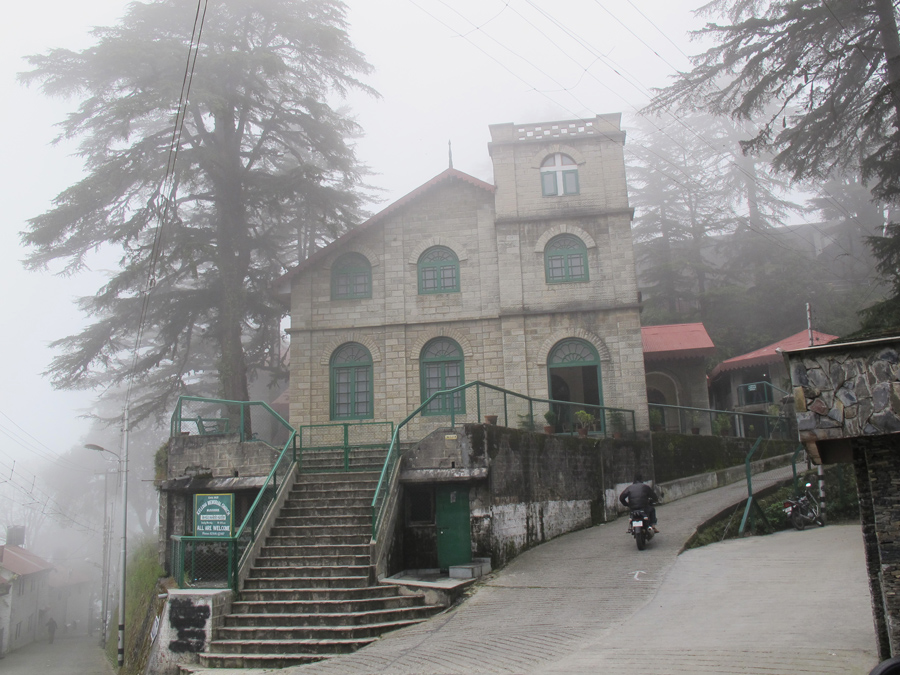

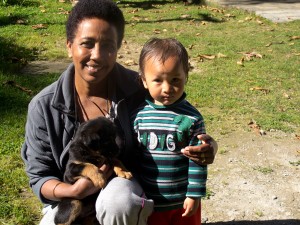
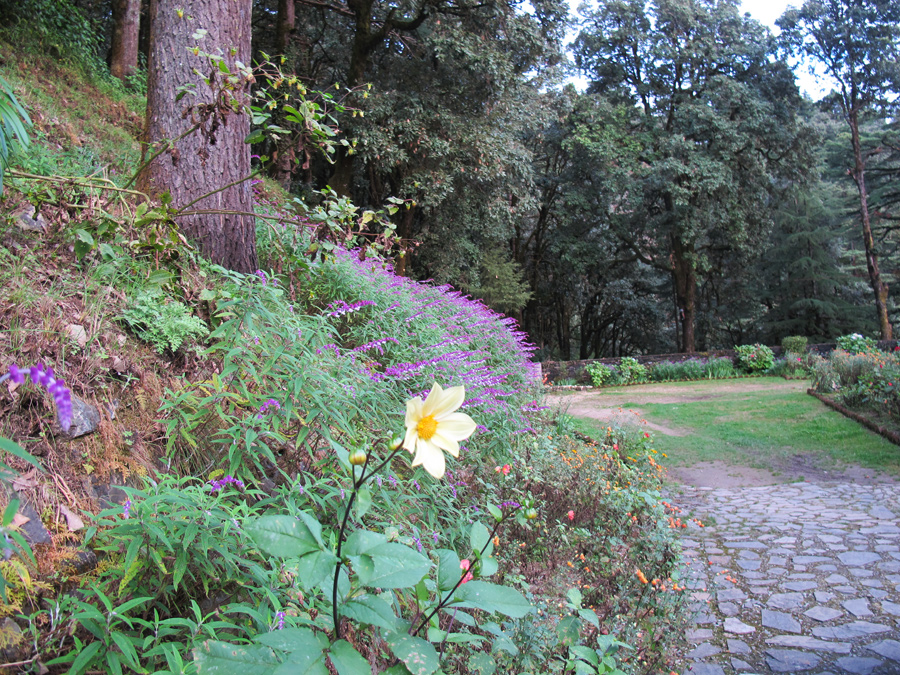
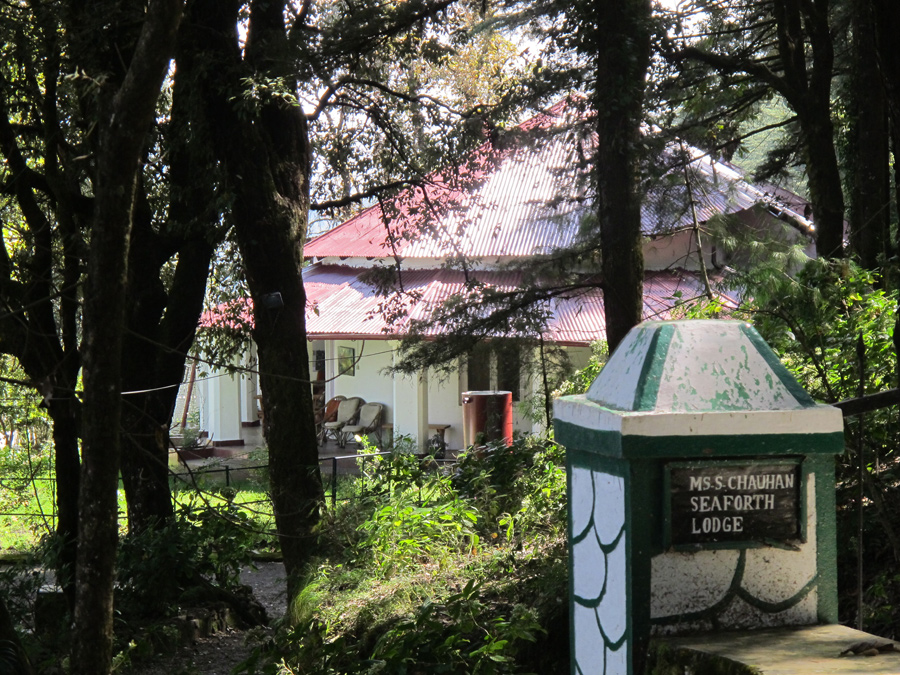
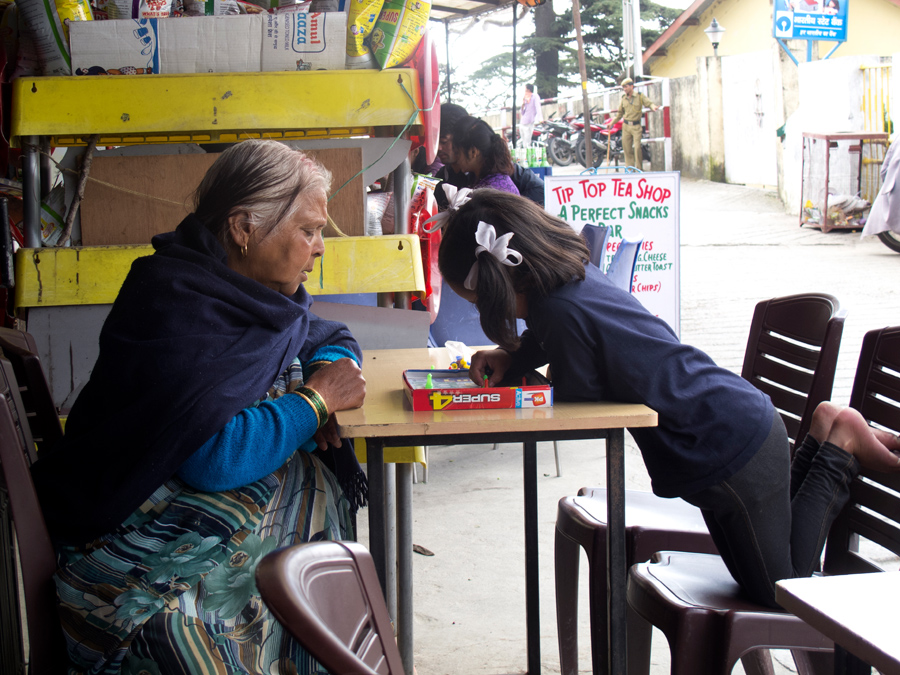
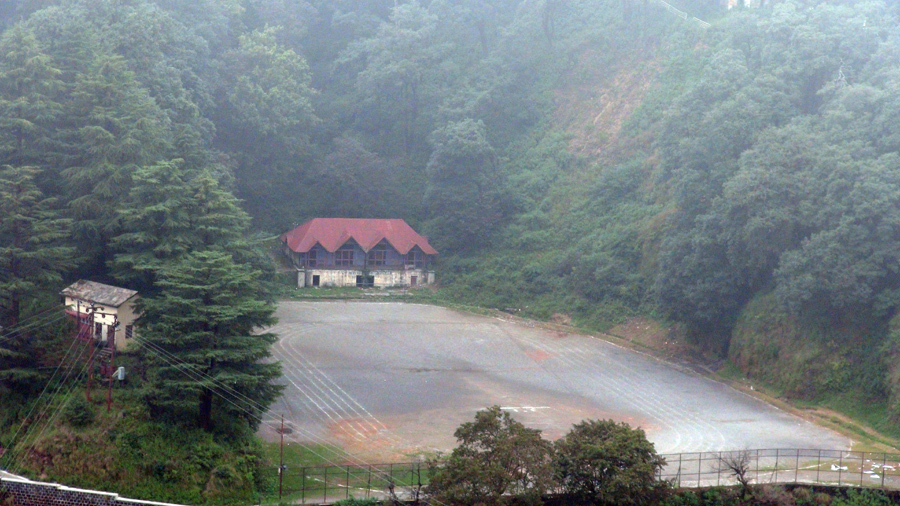
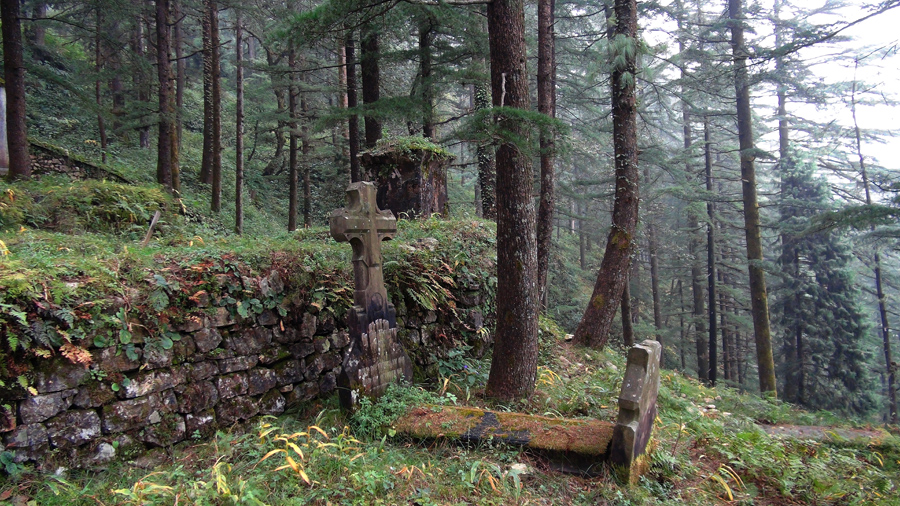
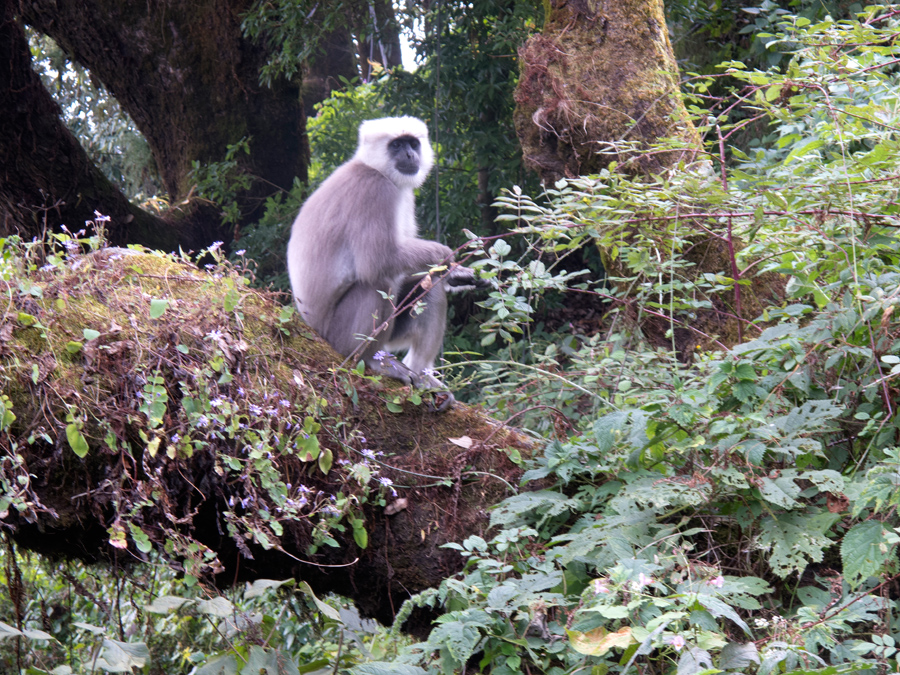
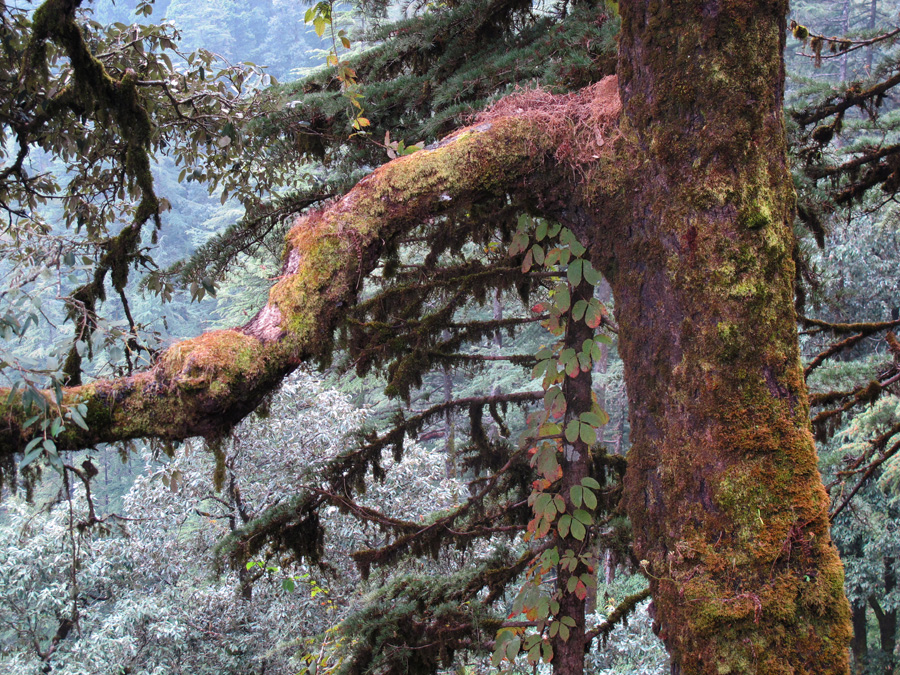
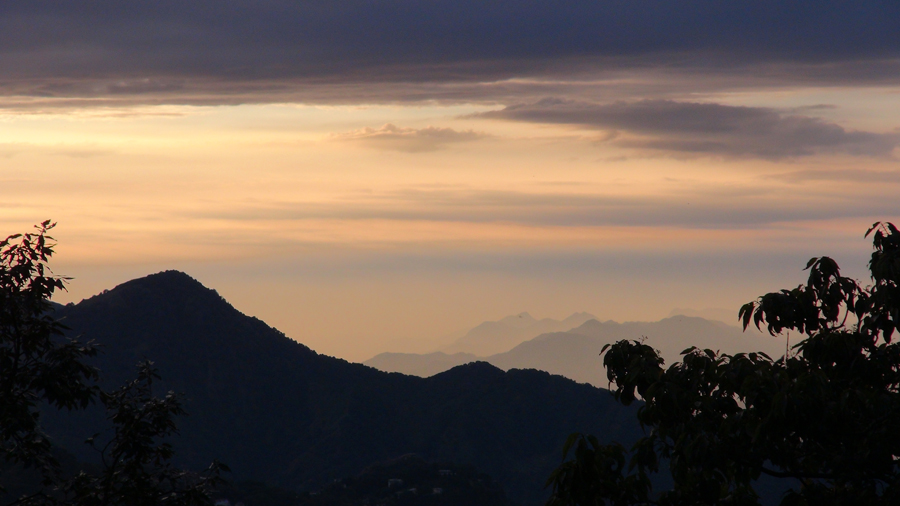
Beyond the beard, hair, and skin colour, Michael and Tom share little resemblance. However, I can see why people made the association, obviously not seeing beyond the beard and hair. In China, Carl became Karl Marx — again, the beard and hair. What they didn’t see was the political resemblance :).
Again, Julie, a masterpiece of evocative writing. I especially like the personal touches — how you struggle and respond to the myriad of people, irritations, triumphs, vistas, and detail. Too often travel writing leaves out the traveller. I’m always interested in the person and the view through a specific set of eyes, rather than the view from no discernible position, as though one person’s experience will be everyone’s experience.
Landour sounds and looks like paradise, somewhat trapped delightfully in time, but for how long? How wonderful to find such places in the most populated countries on earth. I can understand why you want to return; perhaps the study of Hindi is a good excuse to return to India before it completes the transformation to the frantic grasping and anxiety of contemporary global culture.
Hi Joan. Thank you for your positive words! I’m struggling with writing a blog that tells people about a place, as well as making it personal. The reason I began on this format was that when we were researching this journey, for some destinations there was very little information, but at times I found it on people’s travel blogs.
Yet I want to write about details, more. And particular ideas. I find it hard to find time -or the right sort of time and place!
I don’t think Landour will change in a hurry, because of the cantonment and the restrictions on building. That makes it a very unusual place, so close to main cities such as Dehra Dun and Delhi. There are also very few places to stay, mainly little guest houses the students use, not appealing to more upmarket visitors. It’s also very cold a lot of the year, and very wet during the monsoon (I believe). It’s very unusual for India.
A very evocative piece. Your writing kept me captivated, I see you emerging as a writer with a sense of the pulse of the locale. I did not know anything about Landour, thanks for sharing.
Thanks Dipen. It was a fascinating place because of the mix of people. Many stories that I could not tell 🙂 but also -too much to tell. It’s hard to select what to write about in a short space. Denis read my early blog posts – he advised they should not be over 2000 words- of course he used to break his longer ones into Parts 1 and 2.
Jule dearest, thank you for your sensitive vision and description of an obviously extraordinary place. Your writing is very evocative and I also feel inspired to go there. What a treasure to find such a place that is so seemingly not beschmirsed by development and tourism.
Dear Joan, yes, you would like Landour for sure! Although it does involve being in North India, heheh. M and I were telling ourselves it would be easy to get there though -just fly to Delhi and catch the train straight to Dehra Dun ,then a taxi to Landour.
Hi Julie, thanks for this beautiful piece on Landour. I was gently captivated and enthral led by your observations and perceptions of the place. I’m off to read some more!
Hello Mabs, I’m so glad you’ve “turned up on the page” and enjoyed it!
Again Jule, beautifully written, so engaging. Would you spend more time there if you could? Seems just the scene for both of you. Perhaps Michael could begin a new career as a stunt double and you as a ghost writer. But I am sure in time you would both become the true celebrities.
A stunt double!! OMG NO! Though it made me laugh 🙂 such a sweet comment there at the end – true, of course 🙂 How perceptive of you..